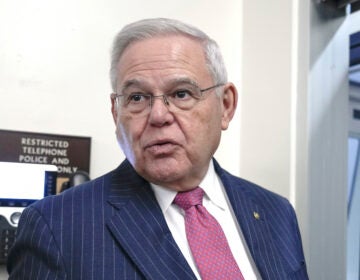Judge rejects Sen. Bob Menendez’s claims that search warrants in bribery case were unconstitutional
The senator's lawyers claimed warrants were “riddled with material misrepresentation and omissions that deceived the authorizing magistrate judge.”

A federal judge on Monday, March 4, 2024, rejected Menendez’s claims that search warrants that led to corruption charges and the discovery of gold bars and cash at his New Jersey home were unconstitutional. (AP Photo/Alex Brandon, File)
What you need to know
- U.S. Sen. Bob Menendez and his wife are accused of using his foreign affairs influence to help Egypt in return for bribes
- Investigators say a search of Menendez’s home yielded nearly $500,000 in hidden cash and $100,000 in gold bars
- This is the second indictment in eight years against Menendez. His unrelated 2015 indictment ended in a mistrial
- Gov. Phil Murphy and a growling list of Senate Democrats have called for the senior senator’s resignation
- Here are some key takeaways from his September indictment.
A federal judge on Monday rejected U.S. Sen. Bob Menendez’s claims that search warrants that led to corruption charges and the discovery of gold bars and cash at his New Jersey home were unconstitutional.
Judge Sidney H. Stein ruled Monday that multiple warrants used to conduct 2022 searches of the Democrat’s email accounts and his home were properly sought and carried out.
The senator’s lawyers had claimed the warrants were “riddled with material misrepresentation and omissions that deceived the authorizing magistrate judge.”
Stein said any omissions in the warrants were not intentional or material and a hearing was not necessary to explore the claims further. He also denied challenges to search warrants by one of three businessmen charged in the case that also resulted in the arrest of Menendez’s wife.
The warrants were issued between January and July 2022, along with a final warrant pertaining to cellular phones last September.
Searches of his home in June 2022 resulted in the discovery of over $100,000 worth of gold bars and more than $480,000 in cash — much of it hidden in closets, clothing and a safe, prosecutors said.
Photos included in an indictment when authorities first announced charges last September showed cash stuffed in envelopes in jackets bearing Menendez’s name. Investigators also said they discovered a Google search by Menendez for the value of a “kilo of gold” and the DNA of one man prosecutors say bribed him on an envelope filled with thousands of dollars.
Menendez, 70, has pleaded not guilty and said the cash found in the house was personal savings he had put away for emergencies. After his fall arrest, Menendez was forced to relinquish his chairmanship of the Senate Foreign Relations Committee but said he would not resign from Congress.
His wife, Nadine Menendez, and two businessmen also have pleaded not guilty. On Friday, one businessman facing charges pled guilty in a cooperation deal with prosecutors that calls for him to testify at any trial.
The trial of Menendez and others is scheduled for May. Lawyers for Menendez did not immediately comment on Stein’s ruling.
A spokesperson for prosecutors declined to comment.
In his ruling, Stein wrote that affidavits supporting requests for search warrants only needed to establish probable cause that searches would turn up “evidence, fruits, or instrumentalities of a crime.”
He said that threshold was “amply satisfied” by evidence described in the affidavit, including numerous messages between Menendez, his wife and one of the businessmen discussing various services and payments that were to be made to Nadine Menendez in return for the senator’s aid to the businessmen.
According to an indictment, Menendez and his wife accepted gold bars and cash from a real estate developer in return for the senator using his clout to get that businessman a multimillion-dollar deal with a Qatari investment fund.
Menendez also was charged with helping another New Jersey business associate get a lucrative deal with the government of Egypt.
WHYY is your source for fact-based, in-depth journalism and information. As a nonprofit organization, we rely on financial support from readers like you. Please give today.






